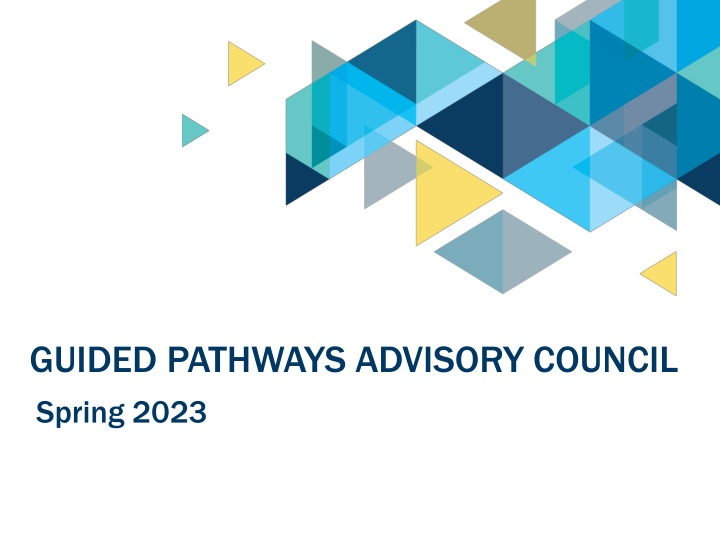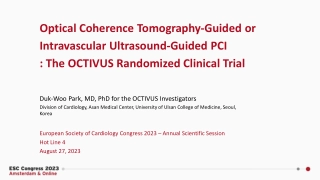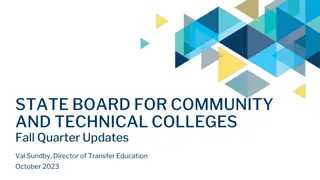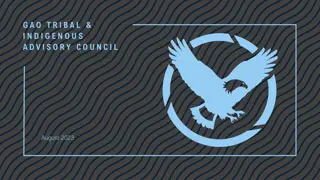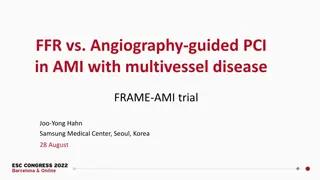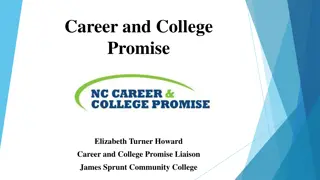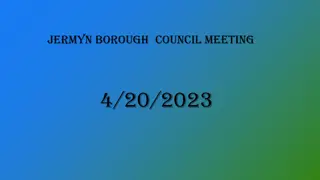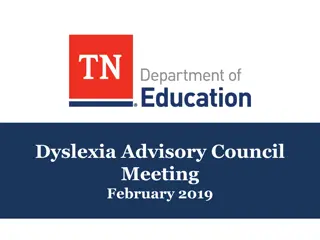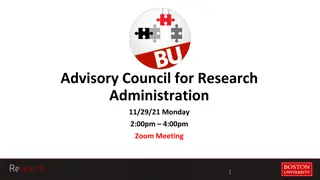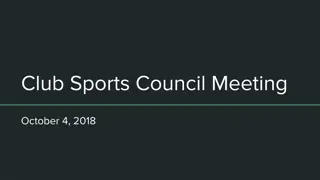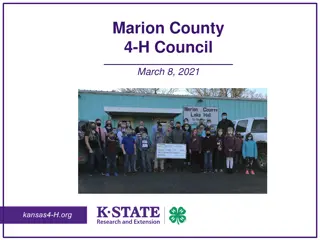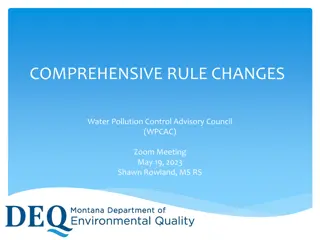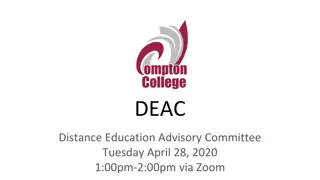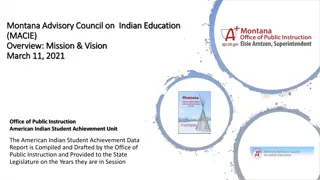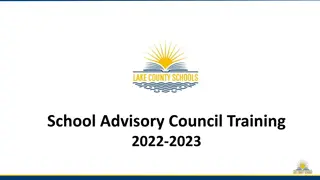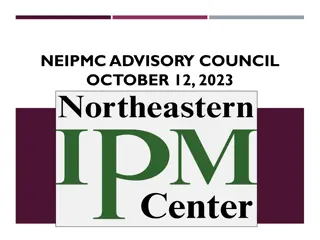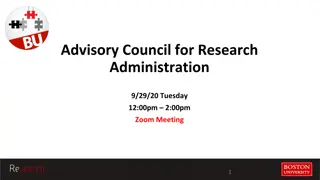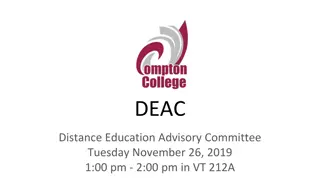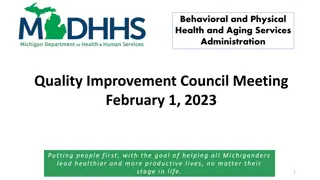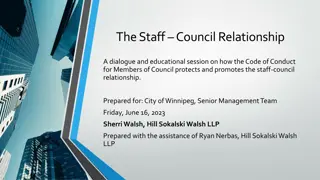Spring 2023 Guided Pathways Advisory Council Meeting Agenda and Updates
The Spring 2023 meeting of the Guided Pathways Advisory Council includes updates from SBCTC, discussions on coaching and pathway work plans, and a land acknowledgment. Networking sessions and staffing updates are also highlighted, along with an overview of Guided Pathways initiatives. The agenda covers various topics aimed at fostering collaboration and progress within the educational community.
Download Presentation

Please find below an Image/Link to download the presentation.
The content on the website is provided AS IS for your information and personal use only. It may not be sold, licensed, or shared on other websites without obtaining consent from the author.If you encounter any issues during the download, it is possible that the publisher has removed the file from their server.
You are allowed to download the files provided on this website for personal or commercial use, subject to the condition that they are used lawfully. All files are the property of their respective owners.
The content on the website is provided AS IS for your information and personal use only. It may not be sold, licensed, or shared on other websites without obtaining consent from the author.
E N D
Presentation Transcript
GUIDED PATHWAYS ADVISORY COUNCIL Spring 2023
WELCOME AND AGENDA Welcome and Introductions/ check in (15 min) SBCTC Updates (15 minutes) Coaching Updates and Discussion (30 minutes) Guided Pathway Work Plan Analysis, Dr. Debra Bragg (30 min) Q&A, Farewell(10 minutes) 2
SBCTC LAND ACKNOWLEDGEMENT As a step toward honoring truth and achieving healing and reconciliation, we open today by acknowledging the traditional territories of the Squaxin Island Tribe of the South Puget Sound. The people of the Squaxin Island Tribe lived and prospered along the shores of the southern most inlets of the Salish Sea for untold centuries. We acknowledge throughout time immemorial, the people of the Squaxin Island Tribe s strong cultural connection with water, and traditionally known as the People of the Water. Today, we honor the descendants of the Squaxin Island Tribe, the People of the Water, on which Washington State Board of Community and Technical Colleges office resides. While we are distributed across many first people s nations, we remain dedicated to opening our time together by honoring those that came before us. We know that such statements only become truly meaningful when coupled with authentic relationships and sustained commitment, and as such, we commit to continued efforts to build our collective understanding and action to foster authentic Tribal community connections. Endorsed by Council Chairman Kristopher Peters, Squaxin Island Tribe 3
NETWORKING/INTRODUCTIONS In Breakouts share a highlight or success from spring quarter so far 4
SUCCESS CENTER STAFFING UPDATES Policy Associate for Faculty Development and Ensured Learning Welcome Guava Jordan! Policy Associate for Math Pathways and Placement Hiring process Underway New Position in Development-Integration and Support for Student Services 6
CTCLINK & GUIDED PATHWAYS Overview of Guided Pathways at ctcLink Reference Center Completed: 13 GP college interviews Themes Improvements to Advisor Management, Advising Center Capabilities Improving the Student Alert process and integrating more closely with Advising Ed Planner Capabilities Software Integration Possibilities (EAB/Compass, HighPoint Mobility/HCX) Future/Next Steps Develop a list of Enhancement Requests Host a special session with the colleges to review findings 7
Annual Guided Pathways Reporting Over the past year, how have you utilized the WEIA investment for the following Guided Pathways work. Student Support Services (advising and counseling) Faculty Engagement Meta Major Development/Program Alignment/ Degree Maps Structured Exploration Technology Data Analytics and Student Tracking Outcomes/Research/Evaluations Other: What are the results your college is seeing as a result of these investments in Guided Pathways? What data has informed your college s understanding of these results? Did COVID-related economic and budget uncertainty impact your investment decisions? Annual 2158 Funding Survey Facilitated by SBCTC Released May 1 Due in August 8
GUIDED PATHWAYS PRELIMINARY REPORT Washington Institute for Public Policy preliminary report due December 2023 Evaluates Guided Pathways on early student outcomes and reviews the implementation of the model in Washington Qualitative data through survey-due February 24th Quantitative data through dashboards and other means Pull from evaluations from College Spark Washington, Community College Research Center, Dr. Debra Bragg 9
COLLEGE SPARK WASHINGTON EVALUATION Bob Watrus and Deena Heg conducting final grant evaluation Interviewing individuals from across the state Examining data Consideration of the impact of high impact practices, what matters most Presentation in the fall of findings 10
GUIDED PATHWAYS WORK PLAN No 2023-2024 Work Plan required Working collaboratively to develop a work plan that is aligned with required Biennial Equity Strategic Plans Consideration of what the system wants and needs, what has and hasn t worked Summer- draft available for comment Fall- work plan released Spring-work plan due 11
ANTIRACIST CURRICULUM INITIATIVE ACI is a statewide community of practice for ENGL& 101 Funded through legislative proviso, focused on implementation of Labor Based Grading Spring Quarter: Leadership Group Implementation Evidence Collection and Data Use Addressing Resistance Antiracist Curriculum Design Communication and Professional Development Resources 12
GP AWARD FOR INNOVATION & EQUITY Create course-based undergraduate research experiences (CURES) to improve teaching and learning and increase educational equity in guided pathways. Yakima Valley College Skagit Valley College Tacoma Community College Green River College Whatcom Community College Awardees will present at the SBCTC Student Success Summit in early September and provide an update/showcase of the curriculum they created and how they designed their scaling approach. 13
PROFESSION DEVELOPMENT Speaker Series Speaker Series Friday, April 28 from 9:00am- 11:30am The Antiracist Writing Workshop in Action & Critique Across Disciples with Felicia Rose Chavez Friday, May 5 from 2:00pm-3:30pm Racialized Wellness with Dr. April Baker-Bell Friday, May 12 from 2:30pm-4:30pm We Gon Be Alright, But That Ain t Alright: Abolitionist Teaching and the Pursuit of Educational Freedom with Dr. Bettina Love Lunch and Learns Lunch and Learns April 10th Inclusive Access: A Success Rate Analysis at Waukesha County Technical College May 4th Shared Responsibility: How Faculty Advisors and Success Coaches Can Work Together to Support Student Success 14
COACHING UPDATES Welcome New Coaches Technical College Convening 15
THE CASE FOR COACHING Coaching is a mechanism for transformational change and an active practice. Colleges can leverage the capacity and knowledge of coaches to make progress on institutional reform agendas to increase student success. Coaches are facilitators, data journeyers, capacity builders, advocates, connectors, & critical friends/partners. SSCN Coaching Program: Facilitating Institutional Transformation CCRI s Lia Wetzstein and Katie Kovacich and our JFF partners, Tara Smith, Jessica Soja, Alexandra Waugh, and Hector Torres 16
CURRENT STATE OF GP COACHING Each college is assigned two coaches Most coaches are either current or retired institutional or system executive leaders from Washington and across the US Coaching primarily occurs virtually Professional development provided year round, opportunities for deeper learning and engagement Varied coaching experiences across the system 17
THE FUTURE OF COACHING Aim to develop a diverse coaching cadre made up of individuals from across the CTC system Support colleges in their work of advancing student success through Guided Pathways, internally and externally Engaged student voice and perspective Empowering all faculty and staff with equity focused change agent skills to facilitate change within institutions and as coaches Competencies of coaches are informed by college needs 18
COACHING DISCUSSION What skills and competencies are most important for Guided Pathways coaches? What institutional positions would be positively impacted by the skill and competency development you ve described? What do you imagine the role students could play in the Guided Pathways coaching process? 19
Questions? Comments? Concerns? Collaboration? Reach out anytime! Monica Wilson Student Success Center & Strategic Initiatives Director mwilson@sbctc.edu 503-307-1555 Note: All material licensed under Creative Commons Attribution 4.0 International License. 20
